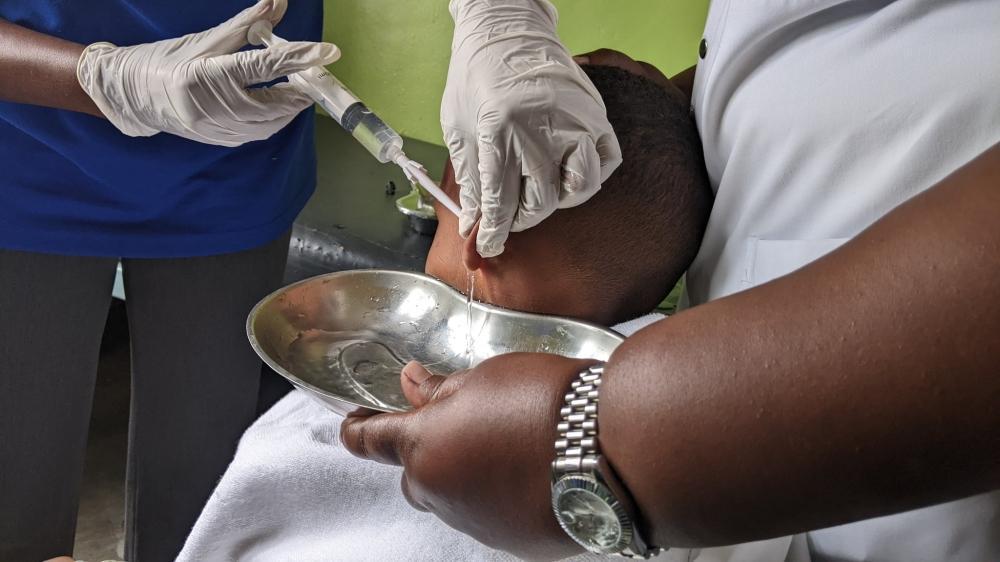Africa-Press – Rwanda. The government plans to quadruple the number of specialized ear doctors (otolaryngologists) in hospitals countrywide to address the rising number of hearing loss-related cases, officials have announced. Since its inception at the University of Rwanda in 2010, the otolaryngology programme has increased the number of specialists from four to 28 by 2025, with an additional 18 currently in training.
Irene Bagahirwa, the head of the injury and disability unit at Rwanda Biomedical Center (RBC), told The New Times that the government plans to address the shortage of ear specialised doctors through the 4×4 reform, a four-year strategy to quadruple the number of healthcare workers. This initiative aims to revamp health education, improve career development, and enhance healthcare worker welfare.
“The 4×4 reform will significantly increase the number of specialized doctors across the country,” she said. “We think this will help us increase the numbers of doctors and have more specialists in different corners across the country within the hospitals. This is a key strategic priority for the Ministry of Health.”
ALSO: Gisenyi hospital raises alarm over unsafe abortions in rural areas
Bagahirwa stressed the seriousness of untreated ear conditions which result in more complications, including disability.
“Ear diseases can lead to significant impairment if left untreated,” Bagahirwa warned.
“The reliance on traditional medicine instead of professional healthcare is a contributing factor to the high number of cases.”
Headlight is one of the expensive medical equipment used in otolaryngology.
A 2022 study by the National Institute of Statistics of Rwanda (NISR), the Census RPHC2 report on socio-economic characteristics of persons with disabilities, indicated that 30 percent – the highest percentage in the country – of people with hearing impairment live in Eastern Province. The census also revealed that Rwanda has 11,537,934 residents aged 5 years and above, with 391,775 having a disability.
The scarcity of otolaryngologists, also known as ear, nose, and throat (ENT) specialists, is a major concern across the country, echoed Dr. Jean d’Amour Byiringiro, one of the country’s few specialists in otorhinolaryngology who is based at Ruhengeri Referral Hospital.
Otorhinolaryngology focuses on diagnosing and treating disorders of the ear, nose, throat, and related head and neck structures.
“We recommend the ministry [of health] to invest in this service by providing more equipment and increasing the number of ENT specialists,” Dr. Byiringiro stated.
“This will ensure timely and effective patient care to satisfy the needs of patients.”
A doctor removing wax from a child’s ear.
Dr. Byiringiro said he faces an overwhelming patient load, seeing approximately 300 patients daily despite the establishment of this ear treatment services, three months earlier. The services offered include infection management, surgery, and hearing assessments.
“This is a beginning service here where we still lack essential equipment,” Dr. Byiringiro explained. “Our capacity remains limited despite being able to use the equipment donated by Project Life.”
“Another critical issue is the limited number of personnel; I’m the only person taking care of all the incoming patients. We have a big number of people on the waiting list, nearly 200 patients. It’s overwhelming and it’s a big challenge when patients, normally, should come and get service without any delays or being on a long waiting list,” he added.
Gratien Tuyishimire, an ENT surgeon and Vice President of Rwanda Otolaryngologists Head and Neck Surgery Society.
Gratien Tuyishimire, another ENT surgeon and Vice President of ROHNSS, said: “There is a need for special consideration as our numbers grow, some specialists should focus on specific areas like ear, nose, or head and neck diseases to provide higher-quality care.”
Currently, all country referral hospitals including Ruhengeri Referral Hospital, Rwanda Military Hospital, CHUK, King Faisal Hospital, and Level II teaching hospitals, offer ear treatment.
For More News And Analysis About Rwanda Follow Africa-Press









